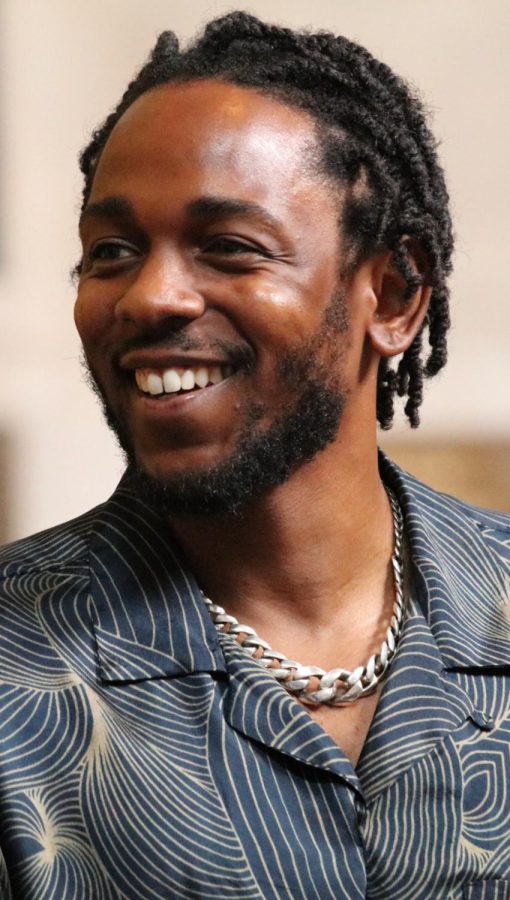Kung Fu Kenny is back. Well, almost.
On April 18, 2022, legendary rapper Kendrick Lamar made an Instagram post announcing that his next album, “Mr. Morale & The Big Steppers,” will be released on May 13 of this year.
Teasing fans with features on his cousin Baby Keem’s newest project, “The Melodic Blue,” Lamar has been starving fans since the release of his critically acclaimed album “DAMN.” in 2017.
The elusive star is idolized for his lyricism and ability to tell stories through rap. In many people’s eyes, Lamar is one of the greatest rappers alive – maybe of all time.
But beyond his raw talent, what is the reason behind his broad appeal? Rapping about racism in America and his upbringing in Compton, Calif., during the crack epidemic of the ‘80s, Lamar has been able to resonate with everyone from late iconic author Toni Morrison to former President Barack Obama. His influence has even reached as far as PV.
Despite growing up in a drastically different era than Lamar, senior Danny DeGeorge articulated the effect the rapper’s music has had on him. “Although I cannot personally relate to the hardships of his life, I know the issues he is tackling are true, and they reflect real American issues,” he said. “To this day, revisiting his music helps me discover new intricacies I had never noticed before.”
Whether it is the stunning isolated poetry on his 2015 album “To Pimp a Butterfly” or simply a hard-hitting bar (which is never too difficult to come by), Lamar’s music is packed full of elements any music lover can, at the very least, appreciate.
DeGeorge further spoke to Lamar’s well-roundedness. “[His] music represents something real, a perfectly crafted story guided by incredible instrumentation and beautiful wordplay that immerses you in the personal experiences of his life,” he said.
Senior Brady Adams expressed a similar sentiment. “Kendrick’s music to me is a way of picturing a life I’ve never known, but in the form of great, well-thought-out music. [His] music is so impactful because his lyrics and music are expressed with pure and strong emotion which makes it very vivid to the listener,” he said. “Kendrick is a special artist because he goes off and creates music about what he truly believes is best for him. He isn’t competing with your everyday rappers for a spot at the table. His music has simply garnered enough attention and praise that he is recognized as one of the greats.”
Simply put, Lamar has paved his own way in the rap genre. And his brave commentary is especially significant today.
But while rap is accepted as a viable form of music now, this was not always the case.
Growing up in a biracial family in the ‘90s, choir director David Baxter witnessed the birth of rap. Over the years, he has seen rap become further validated as the art form it is. “I think the [publicization] of the Black experience, the fascination with the Black experience, through the last couple decades, through music videos, through everything else, especially from non-Black cultures or non-Black demographics, has opened people’s minds and hearts to experiencing and hearing the Black experience, to a point now where it’s not a ‘we’ and ‘them,’” he said.
But are rappers like Lamar the cause or the effect of this phenomenon? Have they played a part in making rap a more palatable genre, or has the music scene grown more inclusive, allowing such rappers to find success?
Baxter argued it is a mix of both. “I think that Kendrick Lamar is both a product of that very slow progression but also using the platform he has to then get an expression of [the Black experience] out, especially with music that is all about the spoken word,” he said.
Defined by storytelling about major issues including race in America and his upbringing during the crack epidemic, Lamar’s raps, though at times controversial, mostly stray away from the often frowned upon themes of rap such as objectification of women and glamorization of drug use. Because of this, many would argue that Lamar has played a part in authenticating rap as a genre.
But Baxter feels such sentiments discredit the rap genre as a whole. “I do think that saying [Kendrick Lamar] validates rap music does rap a disservice because it is an art form that exists as an art form, and whether you like it or not, it is,” he said.
As a fan of rap, Baxter is looking forward to Lamar’s new project. “[I appreciate] being able to have a validation of the Black experience that sometimes is put into direct words that I don’t feel empowered to say in the community I live in and in the family I’ve grown up in,” he said. “And I enjoy hearing that and validating myself…I’m excited to experience that album because I’ve experienced the things that he’s talking about, just as I’ve experienced a lot of the feelings that N.W.A.’s album expressed throughout my life.”
Whether one can admire Lamar’s storytelling from a distance or can deeply resonate with the experiences he has depicted, there is no denying the rapper’s influence. As Lamar superfans and casual listeners alike await “Mr. Morale & The Big Steppers,” the rapper’s history of meticulous and passionate narration will be lost on no one.









